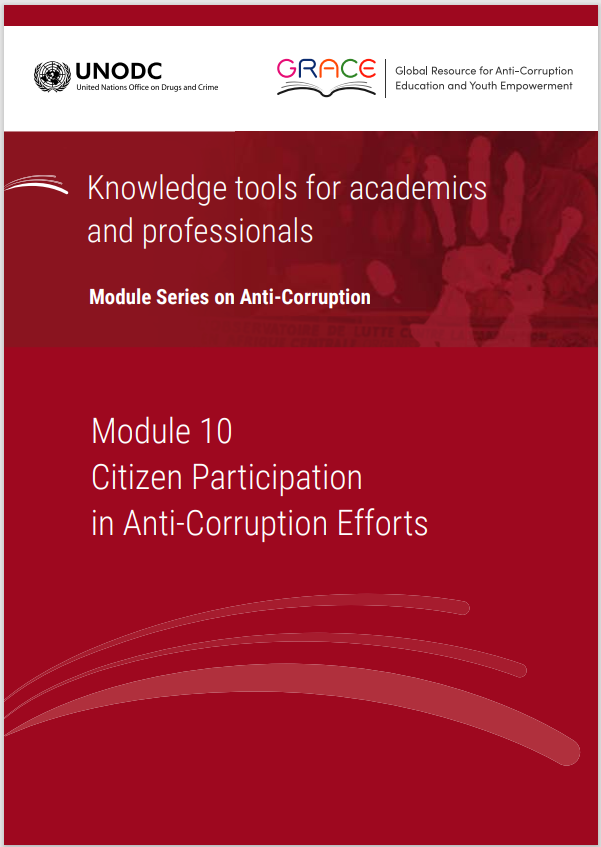This module is a resource for lecturers
Access to information: a condition for citizen participation
One crucial aspect of enabling citizen participation - whether by individuals, groups or the media - is their access to information and the mode in which they access information. Module 6 of the E4J University Module Series on Anti-Corruption introduces the notion of freedom of information (FOI) laws, which increase transparency and thus help the fight against corruption. Numerous non-profit groups around the world disseminate information on FOI laws and pressure governments and public institutions to adopt laws and regulations that facilitate public access to government records and proceedings. Examples of NGOs with a focus on FOI laws include Freedominfo.org and the United States-based National Freedom of Information Coalition located at the University of Florida. The World Bank, the United Nations Development Programme (UNDP) and the OECD also support FOI laws as a tool to combat corruption. While many States over the past few decades have adopted FOI laws, these laws are often seen as contentious (Banisar, 2006). The 2007 Freedom of Information law, which was tabled in Russia, for example, was the longest debated bill in the Duma (for more information on the decision of the Russian Federation to adopt FOI laws, see the University College London article here). To date, numerous countries do not have FOI laws.
In Latvia, for example, the World Bank encouraged freedom of information as a tool to address corruption, strengthen the reform process and "assure vertical (bottom to top and citizens to government) accountability in the system" (World Bank, 2003, p. 4). Although, the Latvian Government adopted a FOI law in 1998, this law was determined not to be enough by the World Bank. Therefore, to fulfil the condition of the World Bank's Programmatic Structural Adjustment Loan, Latvia made additional reforms on information access for the public, including new regulations concerning classification of information and requirements for all public institutions to prepare and publish annual reports on their activities (World Bank, 2003, p. 4).
As the example of FOI reforms in Latvia demonstrates, legal structures must be supplemented with enforcement mechanisms and accountability systems to combat corruption successfully. Kelmore (2016) cautions that while many countries have adopted FOI laws, there is great diversity in the "definitions for both the type of information covered and the nature of the right. Access to various particular types of information is routinely granted in piecemeal fashion through all levels of government including national sub-constitutional laws, national constitutions, and regional and international treaties." In many countries, including the United States, Canada and the United Kingdom, there are also restrictions on FOI laws. To consider an example of how freedom of information is facilitated in the United States and when this right is restricted, see the discussion on the Freedom of Information Act in the United States here.
While some activists rely on FOI laws to obtain information necessary to fight corruption (these are sometimes called "access to information activists"); other activists fight corruption by using information that is already out there (sometimes called "open data activists"). The following quote from the Information Activism website expands on both types of activists:
Access to information activists put pressure on governments to enact and implement laws enabling people to ask questions of any official body that is part of or controlled by the state, and receive prompt and thorough answers. They draw on the idea that information produced using tax money is owned by the tax-paying public, and should be made available to them without restriction. As public bodies respond to people's queries and pro-actively publish the information they create, people are able to see, better understand and scrutinize the workings of the public bodies they fund. Access to information is seen as a necessity for effective participation in public life; a tool to redress one sort of imbalance between people and the powerful institutions that govern them.
Open data activists build on these ideas and concern themselves with the re-use of data and information released by public bodies. … Many people use online forums, social media and blogs as a key part of their lives, using it [ sic] to learn and form opinions and seek advice. Other, more technical groups "mash up" data - putting it online, showing it on maps, making it searchable - to try and show interesting or new things. Open data advocates … argue that public bodies should not only release information and data with modern online habits in mind, but they should do it in a way that removes technical, financial and legal obstacles to any sort of re-use. In practice this means designing methods and standards for releasing different sorts of information in ways that anticipate but don't preclude what people might want to do with it.
 Next:
ICT as a tool for citizen participation in anti-corruption efforts
Next:
ICT as a tool for citizen participation in anti-corruption efforts
 Back to top
Back to top
